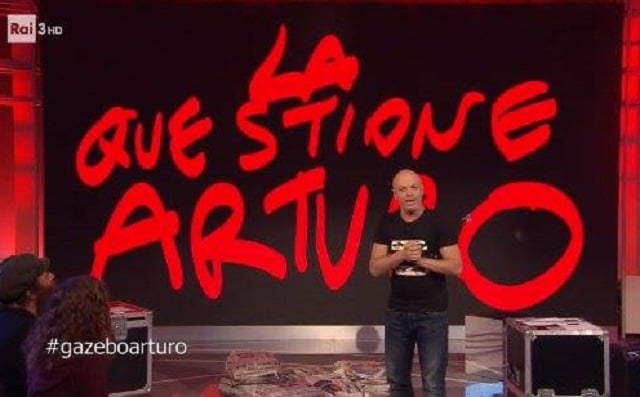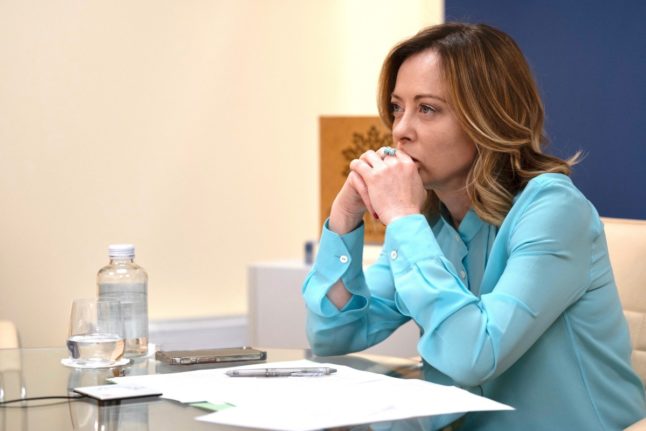The days-old Movimento Arturo (Arthur Movement) was set up by a satirical TV show, but it appears to have gone beyond a joke.
In the ten days since it was born, the 'party' has overtaken the right-wing Northern League in terms of social media following, gained media coverage across Italy – even sparking debate in financial daily Il Sole 24 Ore – and seen branches set up around the country and the world.
The movement is the brainchild of the team behind Gazebo, a talk show which mixes news and entertainment.
In response to the split of Italy's ruling Democratic Party, the presenters discussed possible names for the new movement.
Cartoonist Makkox suggested 'New Left', 'Old Left', and 'Five Left Movement', before arriving at Movimento Arturo – the name 'Arturo' chosen partly because of its similarity to the word 'futuro', often repeated by politicians.
When the official new left-wing party announced their name as the Progressive and Democratic Movement (Movimento dei democratici e dei progressisti), abbreviated to Mo.Dem.Pro, the team criticized the name, with Makkox joking that it was reminiscent of the stock markets.
And Gazebo's lead presenter, Diego Bianchi, announced that Movimento Arturo would set up its own social media profiles, with the aim of “exceeding the new party in followers”.
Prima regola del #movimentoarturo non ci sono regole. Fate da soli, ma fate educati. Siate d'esempio e restate Arturo. @zdizoro @makkox
— Andrea Salerno (@SalernoSal) March 5, 2017
“The first rule of Movimento Arturo is 'there are no rules'” says journalist Andrea Salerno, one of the team.
Within hours, the 'joke' movement had gained 21,000 followers, and has now doubled that figure. As for the Progressive and Democratic Movement, they have yet to reach the 10,000 mark.
Movimento Arturo has also overtaken Matteo Salvini's far-right Northern League party, which can only boast 21,700 followers on Twitter – though Salvini has over 300,000 followers on his personal account.
It will have some way to go to match the other three parties: Forza Italia (135,000 Twitter followers), the Democratic Party (205,000) and the Five Star Movement (471,000).
“Obviously, it started as a provocation, but it's enough to read the different tweets to see that it's going beyond that,” the Calabrian faction of the movement told The Local.
Indeed, different social media users have chimed in on what Arturo means to them, ranging from “Arturo is culture, Arturo is an alternative, Arturo is a union”, to “Arturo is the hiss of the moka”, referring to the traditional Italian coffee pot.
While many are just enjoying the meme, for others it seems to be a way of expressing their real political dissatisfaction.
“Arturo is the political expression of the socialized masses,” said one user, behind the Ancona branch of the new party. “It's a jokey initiative that makes clear the serious need for political identity,” said another, adding: “A moment of seriousness – now I'm going back to taking drugs”.
The map below shows the spread of the Movimento Arturo.
Francesco Barbati, an Italian expat who has set up a Swedish branch for the movement, told The Local, “I wanted to be part of this joke/social phenomenon. As an expat, I'm curious about what happens in my country, especially on the left, and I watched with interest how Gazebo was ironically challenging the 'rebellious' figures who left the PD.”
“Movimento Arturo is a joke, yes, but it can also be seen as a sort of response to what the Left is missing in our country – being detached from the reality, and taking on controversial issues,” added Barbati. “Moreover, I am curious about how far this movement might go, and see the social development of that.”
Al lavoro nel cantiere per la nuova sede del #movimentoarturo.
Nonostante l'occhio attento e invidioso degli attivisti altrui. pic.twitter.com/RXdGkFsHB8— Arturo Groenlandia (@MovArtGroenland) March 5, 2017
At work on the building site for the new headquarters of Movimento Arturo.
Ex-Prime Minister Matteo Renzi's withdrawal as party secretary earlier this year highlighted the party's internal rifts, pushing the party to primary elections and ultimately leading to the founding of the Progressive and Democratic Movement.



 Please whitelist us to continue reading.
Please whitelist us to continue reading.
Member comments